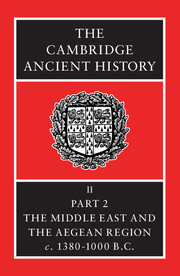Book contents
- Frontmatter
- Contents
- List of Maps
- List of Text-figures
- Preface
- CHAPTER XVII THE STRUGGLE FOR THE DOMINATION OF SYRIA (1400-1300 B.C.)
- CHAPTER XVIII ASSYRIA AND BABYLON, c. 1370-1300 B.C.
- CHAPTER XIX EGYPT: THE AMARNA PERIOD AND THE END OF THE EIGHTEENTH DYNASTY
- CHAPTER XX THE AMARNA LETTERS FROM PALESTINE
- CHAPTER XXI (a) ANATOLIA FROM SHUPPILULIUMASH TO THE EGYPTIAN WAR OF MUWATALLISH
- (b) UGARIT
- (c) TROY VII
- CHAPTER XXII (a) THE EXPANSION OF MYCENAEAN CIVILIZATION
- (b) CYPRUS IN THE LATE BRONZE AGE
- CHAPTER XXIII EGYPT: FROM THE INCEPTION OF THE NINETEENTH DYNASTY TO THE DEATH OF RAMESSES III
- CHAPTER XXIV THE HITTITES AND SYRIA (1300-1200 B.C.)
- CHAPTER XXV ASSYRIAN MILITARY POWER 1300-1200 B.C.
- CHAPTER XXVI (a) PALESTINE IN THE TIME OF THE NINETEENTH DYNASTY: THE EXODUS AND WANDERINGS
- (b) ARCHAEOLOGICAL EVIDENCE
- CHAPTER XXVII THE RECESSION OF MYCENAEAN CIVILIZATION
- CHAPTER XXVIII THE SEA PEOPLES
- CHAPTER XXIX ELAM c. 1600-1200 B.C.
- CHAPTER XXX PHRYGIA AND THE PEOPLES OF ANATOLIA IN THE IRON AGE
- CHAPTER XXXI ASSYRIA AND BABYLONIA, c. 1200-1000 B.C.
- CHAPTER XXXII ELAM AND WESTERN PERSIA, c. 1200-1000 B.C.
- CHAPTER XXXIII SYRIA, THE PHILISTINES, AND PHOENICIA
- CHAPTER XXXIV THE HEBREW KINGDOM
- CHAPTER XXXV EGYPT: FROM THE DEATH OF RAMESSES III TO THE END OF THE TWENTY-FIRST DYNASTY
- CHAPTER XXXVI THE END OF MYCENAEAN CIVILIZATION AND THE DARK AGE
- CHAPTER XXXVII THE WESTERN MEDITERRANEAN
- CHAPTER XXXVIII GREEK SETTLEMENT IN THE EASTERN AEGEAN AND ASIA MINOR
- CHAPTER XXXIX (a) THE PREHISTORY OF THE GREEK LANGUAGE
- CHAPTER XXXIX (b) THE HOMERIC POEMS AS HISTORY
- CHAPTER XL THE RELIGION AND MYTHOLOGY OF THE GREEKS
- BIBLIOGRAPHIES
- Chronological Tables
- Index to Maps
- General Index
- Map 1. Ancient Asia Minor and Northern Mesopotamia
- Map 3. Distribution of Mycenaean sites and remains in Greece and the Aegean
- Map 14. The Western Mediterranean
- References
CHAPTER XXXIX (b) - THE HOMERIC POEMS AS HISTORY
Published online by Cambridge University Press: 28 March 2008
- Frontmatter
- Contents
- List of Maps
- List of Text-figures
- Preface
- CHAPTER XVII THE STRUGGLE FOR THE DOMINATION OF SYRIA (1400-1300 B.C.)
- CHAPTER XVIII ASSYRIA AND BABYLON, c. 1370-1300 B.C.
- CHAPTER XIX EGYPT: THE AMARNA PERIOD AND THE END OF THE EIGHTEENTH DYNASTY
- CHAPTER XX THE AMARNA LETTERS FROM PALESTINE
- CHAPTER XXI (a) ANATOLIA FROM SHUPPILULIUMASH TO THE EGYPTIAN WAR OF MUWATALLISH
- (b) UGARIT
- (c) TROY VII
- CHAPTER XXII (a) THE EXPANSION OF MYCENAEAN CIVILIZATION
- (b) CYPRUS IN THE LATE BRONZE AGE
- CHAPTER XXIII EGYPT: FROM THE INCEPTION OF THE NINETEENTH DYNASTY TO THE DEATH OF RAMESSES III
- CHAPTER XXIV THE HITTITES AND SYRIA (1300-1200 B.C.)
- CHAPTER XXV ASSYRIAN MILITARY POWER 1300-1200 B.C.
- CHAPTER XXVI (a) PALESTINE IN THE TIME OF THE NINETEENTH DYNASTY: THE EXODUS AND WANDERINGS
- (b) ARCHAEOLOGICAL EVIDENCE
- CHAPTER XXVII THE RECESSION OF MYCENAEAN CIVILIZATION
- CHAPTER XXVIII THE SEA PEOPLES
- CHAPTER XXIX ELAM c. 1600-1200 B.C.
- CHAPTER XXX PHRYGIA AND THE PEOPLES OF ANATOLIA IN THE IRON AGE
- CHAPTER XXXI ASSYRIA AND BABYLONIA, c. 1200-1000 B.C.
- CHAPTER XXXII ELAM AND WESTERN PERSIA, c. 1200-1000 B.C.
- CHAPTER XXXIII SYRIA, THE PHILISTINES, AND PHOENICIA
- CHAPTER XXXIV THE HEBREW KINGDOM
- CHAPTER XXXV EGYPT: FROM THE DEATH OF RAMESSES III TO THE END OF THE TWENTY-FIRST DYNASTY
- CHAPTER XXXVI THE END OF MYCENAEAN CIVILIZATION AND THE DARK AGE
- CHAPTER XXXVII THE WESTERN MEDITERRANEAN
- CHAPTER XXXVIII GREEK SETTLEMENT IN THE EASTERN AEGEAN AND ASIA MINOR
- CHAPTER XXXIX (a) THE PREHISTORY OF THE GREEK LANGUAGE
- CHAPTER XXXIX (b) THE HOMERIC POEMS AS HISTORY
- CHAPTER XL THE RELIGION AND MYTHOLOGY OF THE GREEKS
- BIBLIOGRAPHIES
- Chronological Tables
- Index to Maps
- General Index
- Map 1. Ancient Asia Minor and Northern Mesopotamia
- Map 3. Distribution of Mycenaean sites and remains in Greece and the Aegean
- Map 14. The Western Mediterranean
- References
Summary
INTRODUCTION
The survival of some twenty-eight thousand lines of poetry almost contemporary with his period of study, and concerning one of its chief events, is a gift of which the historian can hardly complain. The Iliad and Odyssey provide a more graphic and more detailed account of life around the end of the Bronze Age than exists for any other period in Greece until the late fifth century B.C. There emerges from them a wonderful if rather indistinct picture of what it was like to be an Achaean nobleman on campaign, or traversing dangerous seas, or at home in his palace. They give a generous if blurred taste of a distant heroic age, its beliefs, customs and limitations. Yet the picture is indistinct, the taste blurred, and the historian must ruthlessly resist their vague and merely aesthetic blandishments. Not that the indistinct picture is entirely without historical value: in itself, indeed, it may contain more of history, in one real sense of the word, than bare archaeological facts devoid of human mediation and direct human reference. Nevertheless those bare facts are necessary as a framework, and without enough of them the literary and humane picture often becomes horribly misleading. Now some literary pictures contain, clearly visible, their own factual framework, and that at first sight may seem to be the case with the Homeric poems. Yet the truth is that they turn out on inspection to be fickle and treacherous in this respect. In the present context, therefore, it is more necessary to assess with unsentimental accuracy the nature of the Iliad and Odyssey as evidence than to expound their beauty or the detailed structure of their plot.
- Type
- Chapter
- Information
- The Cambridge Ancient History , pp. 820 - 850Publisher: Cambridge University PressPrint publication year: 1975
References
- 10
- Cited by

